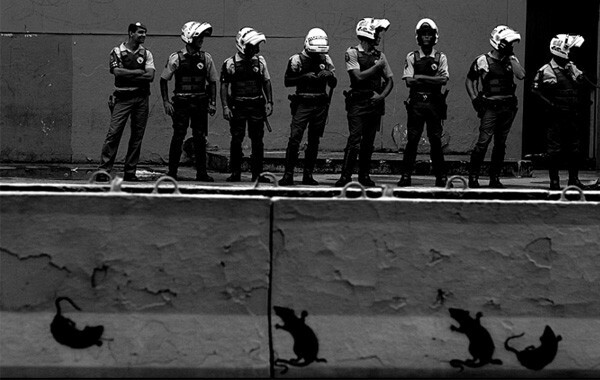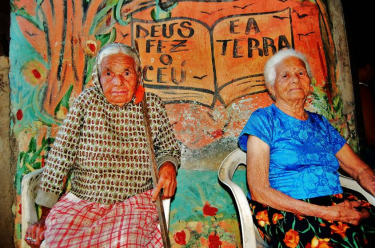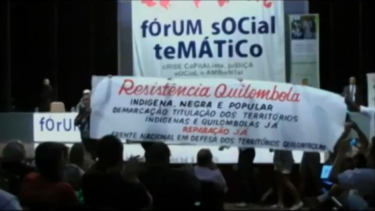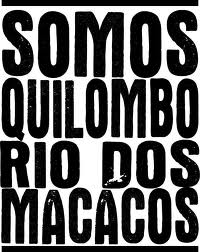Postado originalmente por
apublica.org em http://apublica.org/2012/02/pl-quer-punir-terroristas-grevistas-na-copa/
Por Andrea Dip
Trazido a minha atencao por
@PersonalEscrito via Twitter
Originally posted by
apublica.org at http://apublica.org/2012/02/pl-quer-punir-terroristas-grevistas-na-copa/
By Andrea Dip
Brought to my attention by
@PersonalEscrito via Twitter
(The English translation follows immediately below the Portuguese text)

“É a ditadura transitória da
FIFA” diz presidente da Comissão de Direitos Humanos da OAB-SP, sobre projeto
que corre no Senado em paralelo a Lei Geral da Copa
Enquanto as atenções estão
voltadas para o projeto de Lei Geral da Copa (2.330/11) que está sendo votado
na Câmara nesta terça-feira (28), os senadores Marcelo Crivella (PRB-RJ), Ana
Amélia (PP-RS) e Walter Pinheiro (PTB-BA) correm com outro Projeto de Lei no
Senado, conhecido pelos movimentos sociais como “AI-5 da Copa” por, dentre
outras coisas, proibir greves durante o período dos jogos e incluir o
“terrorismo” no rol de crimes com punições duras e penas altas para quem
“provocar terror ou pânico generalizado”.
O PL 728/2011, apresentado no
Senado em dezembro de 2011, ainda aguarda voto do relator Álvaro Dias (PSDB-PR)
na Comissão de Educação, Cultura e Esporte do Senado. Se for aprovado, vai
criar oito novos tipos penais que não constam do nosso Código Penal como
“terrorismo”, “violação de sistema de informática” e “revenda ilegal de
ingressos”, determinando penas específicas para eles. Essa lei – transitória –
valeria apenas durante os jogos da FIFA.
Na justificativa da proposta, os
senadores alegam que a Lei Geral da Copa deixa de fora a tipificação de uma
série de delitos, necessária para “garantir a segurança durante os jogos”.
O projeto prevê ainda que quem
“cometer crimes contra a integridade da delegação, árbitros, voluntários ou
autoridades públicas esportivas com o fim de intimidar ou influenciar o
resultado da partida de futebol poderá pegar entre dois e cinco anos de
prisão”.
Para quem “violar, bloquear ou
dificultar o acesso a páginas da internet, sistema de informática ou banco de
dados utilizado pela organização dos eventos” a pena seria de um a quatro anos
de prisão, além de multa. E para deixar a aplicação das penas ainda mais
eficaz, o projeto prevê a instauração de um “incidente de celeridade
processual” (art. 15), um regime de urgência em que a comunicação do delito
poderia se dar por mensagem eletrônica ou ligação telefônica e funcionaria
também nos finais de semana e feriados.
O presidente da Comissão de
Direitos Humanos da OAB de São Paulo Martim Sampaio considera o projeto um
“atentado contra o Estado Democrático de Direito”. “É um projeto de lei absurdo
que quer sobrepor os interesses de mercado à soberania popular. Uma lei para
proteger a FIFA e não os cidadãos e que, além de tudo, abre precedentes para
injustiças por suas definições vagas”, diz o advogado.
Para Thiago Hoshino, assessor
jurídico da organização de direitos humanos Terra de Direitos e integrante do
Comitê Popular da Copa de Curitiba, a questão é ainda mais complicada. Ele
acredita que a junção de tantos assuntos em um mesmo projeto é uma tentativa de
aprovar leis antigas que endurecem principalmente a legislação penal: “É um
bloco perigoso que viola garantias básicas da Constituição. E há sempre o risco
de estas leis transitórias se tornarem permanentes. A legislação da Copa é, na
verdade, um grande laboratório de inovações jurídicas. Depois o que for
proveitoso pode permanecer. É mais fácil tornar uma lei transitória permanente
do que criar e aprovar uma nova” explica.
Terrorismo
O que chama a atenção logo de cara
no projeto de lei é a tipificação de “terrorismo”, que até hoje não existe no
nosso código penal. No PL, ele é definido como “o ato de provocar terror ou
pânico generalizado mediante ofensa à integridade física ou privação da
liberdade de pessoa, por motivo ideológico, religioso, político ou de
preconceito racial, étnico ou xenófobo” com pena de no mínimo 15 e no máximo 30
anos de reclusão. Martim Sampaio diz que este é o artigo mais perigoso por não
dar definições exatas sobre o termo: “Da maneira como está na lei, qualquer
manifestação, passeata, protesto, ato individual ou coletivo pode ser entendido
como terrorismo. Isso é um cheque em branco na mão da FIFA e do Estado”.
Documentos revelados pelo
WikiLeaks revelaram a pressão americana para que o Brasil criasse uma lei para
o “terrorismo”, principalmente para assegurar os megaeventos. No relatório de
Lisa Kubiske, conselheira da Embaixada americana em Brasília, enviado para os
EUA em 24 de dezembro de 2010, a diplomata mostra-se preocupada com as
declarações de Vera Alvarez, chefe da Coordenação-Geral de Intercâmbio e
Cooperação Esportiva do Itamaraty porque a brasileira “admite que terroristas
podem atacar o Brasil por conta das Olimpíadas, uma declaração pouco comum de
um governo que acredita que não haja terrorismo no País”.
Os banqueiros também pressionam o
Estado a criar uma lei antiterrorismo há algum tempo. Também em 2010, a falta
de uma legislação específica sobre terrorismo foi o principal foco em um
congresso sobre lavagem de dinheiro e financiamento de grupos extremistas
organizado pela Federação Brasileira de Bancos (Febraban), em São Paulo. A
questão poderia custar ao Brasil a exclusão do Grupo de Ação Financeira
Internacional (Gafi), órgão multinacional que atua na prevenção desses crimes.
Greves
O projeto de lei também mira
reduzir o direito à greve, prevendo a ampliação dos serviços essenciais à
população durante a Copa – como a manutenção de portos e aeroportos, serviços
de hotelaria e vigilância – e restringe a legalidade da greve de trabalhadores
destes setores, incluindo os que trabalham nas obras da Copa, de três meses
antes dos eventos até o fim dos jogos. Se aprovado, os sindicatos que decidirem
fazer uma paralisação terão de avisar com 15 dias de antecedência e manter ao menos
70% dos trabalhadores em atividade. O governo ainda estará autorizado a
contratar trabalhadores substitutos para manter o atendimento, o que é proibido
pela lei 7.283/1989 em vigor no país, que estabelece 72 horas de antecedência
para o aviso de greve e não determina um percentual mínimo de empregados em
atividade durante as paralisações.
Eli Alves, presidente da Comissão
de Direito Trabalhista da OAB-SP, lembra que o direito à greve também é
garantido na Constituição Federal e diz que a sensação que fica é a de que “o
Brasil está sendo alugado para a FIFA, flexibilizando suas próprias regras para
fazer a Copa no país”. Martim Sampaio lembra que as greves foram proibidas
durante a ditadura militar: “A gente conquistou este direito com o fim da
ditadura, muitas vidas foram perdidas neste processo. Não é possível que agora
criemos uma ditadura transitória da FIFA”. E convoca: “O único jeito de não
deixar esta lei ser aprovada é por pressão popular. A gente tem bons exemplos
de que isso funciona como a da lei da ficha limpa. É preciso conquistar a
democracia todos os dias”.
Você sabe de mais algum projeto de
lei que corre paralelo à Lei Geral da Copa? Mande para nós! Vamos fomentar o
debate a respeito do assunto!
Foto de abertura gentilmente
cedida por Daniel Kfouri.
---------------------------
"It is the dictatorship of the transitional FIFA" says president of the Human Rights Commission of OAB-SP on the Senate bill that runs parallel to the General Law of the CupWhile attention is focused on the design of the General Law of the Cup (2.330/11) being voted in the House on Tuesday (28), Senators Marcelo Crivella (PRB-RJ), Ana Amelia (PP-RS) and Walter Pinheiro (PTB-BA) are busy with another Bill in the Senate, known by social movements as "AI-5 Cup" by, among other things, prohibit strikes during the period of the games and include the "terrorism" in the list ofcrimes with harsh punishments and penalties for those high "causing widespread panic or terror."
The PL 728/2011, introduced in the
Senate in December 2011, still awaits the vote of rapporteur Alvaro Dias
(PSDB-PR) who is on the Committee on Education, Culture and Sports of the
Senate. If approved, it will create eight new crimes not listed in our Penal
Code as "terrorism", "Violation of computer system" and
"illegal resale of tickets," determining specific penalties for
them. This law - is transient - effective only during the FIFA games.In
justification of the proposal, the senators argue that the General Law of the
World Cup leaves out the characterization of a series of crimes, needed to
"ensure security during the games."
The bill also provides that those
who "commit crimes against the integrity of the delegation, referees,
volunteers and sports authorities in order to intimidate or influence the
outcome of football match may be subject to imprisonment of between two and
five years."
For those who "violate, block
or impede access to web pages, computer system or database used by the
organization of events" this could result in prison terms of one to four
years and a fine. And to make the application of penalties even more
effective, the project aims to establish a "sped up procedure" (Art.
15), where the sentencing of the offense could be by e-mail or phone call
and would also be conducted on weekends and holidays.
The president of the Human Rights
Commission of OAB Sao Paulo Sampaio Martin considers the project an
"attack against the democratic state." "It's an absurd bill
that would override the interests of the market for popular sovereignty. A
law to protect FIFA and not citizens, due to its vaguness could set precedents
for injustices, "says the lawyer. (if this translation is not entirely
accurate, please let me know and I'll make a correction)
For Thiago Hoshino, legal advisor
to the human rights organization Land Rights Committee and member of the
People's Cup in Curitiba, the question is even more complicated. He
believes that the addition of many subjects in the same project is an attempt to
pass laws that harden the old primarily criminal law: "It's a dangerous
block that violates basic guarantees of the Constitution. And there's
always the risk of these transitional laws becoming permanent. The
legislation specific to the Cup is actually a great laboratory of legal
innovations. After whatever is useful may remain. It is easier to
make permanent a temporary law rather than to create and approve a new
one" he explains.
Terrorism
What draws attention right away in
the bill is the characterization of "terrorism", which even today
does not exist in our penal code. In PL, it is defined as "the act of
causing widespread panic through terror or harm to physical integrity or
deprivation of liberty of person, for reasons ideological, religious, political
or racial, ethnic or xenophobic" with a sentence of at least 15 and a
maximum of 30 years in prison. Sampaio Martin says this is the more
dangerous article as it does not to give an exact definitions of the term:
"The way is described in the law, any demonstration, rally, protest, act
individually or collectively can be understood as terrorism. This is a
blank check in hand from FIFA and the state. "
Documents revealed by Wikileaks
indicated the U.S. pressure on Brazil to create a law for "terrorism",
especially during mega events. In a report by Lisa Kubiske, counselor at
the U.S. Embassy in Brasilia, sent to the U.S. on December 24, 2010, the
diplomat shows concern over the statements of Vera Alvarez, head of the General
Coordination of Exchanges and Cooperation of the Foreign Ministry for
Sports Brazil's where she "admits that terrorists can attack Brazil
because of the Olympics, an unusual statement from a government that believes
that there is no terrorism in the country."
The bankers have also pressed the
State to create an anti-terrorism law for some time. Also in 2010, the
lack of specific legislation on terrorism was the main focus of a conference on
money laundering and financing of extremist groups organized by the Brazilian
Federation of Banks (Febraban), in Sao Paulo. The issue could cost Brazil
the potential exclusion from the International Financial Action Task Force
(FATF), a multinational agency that works to prevent these crimes.
Strikes
The bill also aims to reduce the
right to strike, providing for the expansion of essential services to the
population during the World Cup - as the maintenance of ports and airports,
hotel services and surveillance - this restricts the legality of the strike of
workers in these sectors, for a period of three months before the events
begins until the end of games. If approved, should the unions decide to do
a shutdown, they must provide notification 15 days in advance and keep at least
70% of workers at work. The government would still be allowed to hire
replacement workers to keep the service, which is prohibited by law 7.283/1989,
establishing a 72-hour advance notice for the strike and does not prescribe a
minimum percentage of employees working for downtime. (not an accurate
translation - will fix this sentence tomorrow, but you get the idea)
Eli Ahmed, chairman of the Labor
Law of the OAB-SP, states that the right to strike is also guaranteed by the
Constitution and says that the feeling in Brazil is that "Brazil is being
rented for FIFA, by easing their own rules to make the finals take place
in the country. " Sampaio Martin recalls that strikes were banned
during the military dictatorship: "We won this right with the end of the
dictatorship, many lives were lost in this process. It is possible that
now that we are creating a temporary dictatorship of FIFA. " He
states: "The only way to not let this law is to be approved by popular
pressure. We have good examples of this works as the law of clean
slate. It is necessary to win democracy every day."
Do you know of more bills that run
parallel to the General Law of the World Cup? Send it to us (apublica.or) ! We
will encourage debate on the subject!
Photo at the beginning of this
article is courtesy of Daniel Kfouri.



